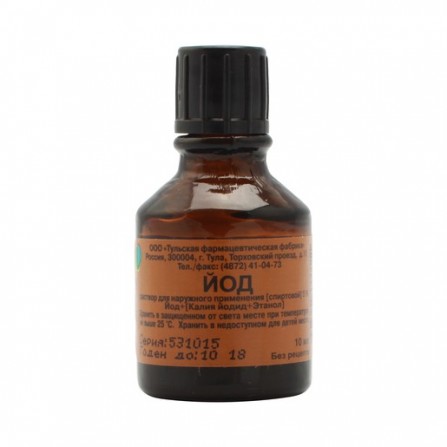Iodine solution alcohol 5% 10ml
Condition: New product
998 Items
Rating:
Be the first to write a review!

More info
Active ingredients
Iodine + [Potassium Iodide + Ethanol]
Release form
Solution
Composition
Active ingredient: Iodine (Iodine) Concentration of active ingredient: 0.5 ml
Pharmacological effect
Elemental iodine has pronounced antimicrobial properties. For preparations of elemental iodine, a pronounced local irritating effect on tissue is typical, and in high concentrations - a cauterizing effect. Local action is due to the ability of elemental iodine to precipitate tissue proteins. Drugs that chip off elemental iodine have a much less pronounced irritant effect, and iodides have local irritating properties only in very high concentrations. The character of the resorptive effect of drugs of elemental iodine and iodides is the same. The most pronounced effect of the resorptive effect of iodine preparations on the function of the thyroid gland. When iodine deficiency iodides contribute to the restoration of impaired synthesis of thyroid hormones. With a normal iodine content in the environment, iodides inhibit the synthesis of thyroid hormones, the sensitivity of the thyroid gland to the TSH of the pituitary gland decreases and its secretion by the pituitary gland is blocked. The effect of iodine preparations on the metabolism is manifested by increased dissimilation processes. In atherosclerosis, they cause a slight decrease in the concentration of cholesterol and beta-lipoproteins in the blood; in addition, they increase the fibrinolytic and lipoproteinase activity of the blood serum and slow down the rate of blood coagulation. While accumulating in syphilitic gums, iodine promotes their softening and resorption. However, the accumulation of iodine in tubercular foci leads to an increase in the inflammatory process in them. Excretion of iodine by the excretory glands is accompanied by irritation of the glandular tissue and increased secretion. This is due to the expectorant effect and stimulation of lactation (in small doses). However, in large doses, iodine preparations can cause lactation inhibition.
Indications
Inflammatory diseases of the skin and mucous membranes, myositis, neuralgia, atherosclerosis.
Contraindications
Hypersensitivity to iodine. For oral administration - pulmonary tuberculosis, nephritis, nephrosis, adenoma (includingthyroid gland), furunculosis, acne, chronic pyoderma, hemorrhagic diathesis, urticaria, pregnancy, children under 5 years of age.
Use during pregnancy and lactation
Contraindicated for oral administration during pregnancy.
Dosage and administration
When applied externally, damaged skin is treated with iodine. For oral administration, the dose is set individually, depending on the indications and the patient's age. They are used for washing the lacunae and supratonsillar spaces - 4-5 procedures at intervals of 2–3 days, for irrigation of the nasopharynx - 2 each - 3 times a week for 2-3 months, for instillation into the ear and rinsing - for 2-4 weeks; in surgical practice and in case of burns, gauze wipes are applied to the affected surface as needed.
Side effects
Skin irritation; with long-term use on extensive wound surfaces - iodism (rhinitis, urticaria, angioedema, salivation, watering, acne). When ingested: allergic skin reactions, tachycardia, nervousness, sleep disorders, increased sweating, diarrhea (in patients older than 40 years ).
Interaction with other drugs
Pharmaceutically incompatible with essential oils, ammonia solutions, white sedimentary mercury (an explosive mixture is formed). Alkaline or acidic environment, the presence of fat, pus, blood weaken antiseptic activity. Weakens hypothyroid and strumogenic effect of lithium preparations.
special instructions
With prolonged use possible effects of iodism.


